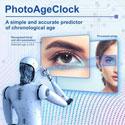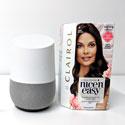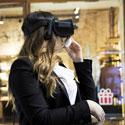Highlights
Collaboration Develops AI-Based Age Predictor For Personalized Skin Care

Haut.ai, an artificial intelligence company, and Incscillio Medicine have teamed up to explore how skin ages and to develop an accurate predictor of chronological age. The PhotoAgeClock uses artificial intelligence to look at visual biomarkers of age, to predict age within an average of 2.3 years. Skin around eyes is the best biomarker for assessing age, and the data can be used for personalized medical and skin treatment to slow the aging process. The research was published in the journal Aging.[Image Credit: © Haut.AI]
Foreo Continues Its Expansion In Travel Retail
 Beauty tech company Foreo has grown quickly within travel retail over the last two years, reaching over 200 outlets in over 20 countries. One of its innovations is the UFO ‘smart mask’. Although Asia is currently its main geographic region, it will focus on other regions next year, especially Europe, North America and Latin America. South Korea is a very important duty free market for the Swedish brand, with distribution in all of the top Korean travel retailers. The 20th and latest Korean opening was the recent launch at Hyundai Duty Free in Seoul’s Gangnam area. [Image Credit: © FOREO]
Beauty tech company Foreo has grown quickly within travel retail over the last two years, reaching over 200 outlets in over 20 countries. One of its innovations is the UFO ‘smart mask’. Although Asia is currently its main geographic region, it will focus on other regions next year, especially Europe, North America and Latin America. South Korea is a very important duty free market for the Swedish brand, with distribution in all of the top Korean travel retailers. The 20th and latest Korean opening was the recent launch at Hyundai Duty Free in Seoul’s Gangnam area. [Image Credit: © FOREO]
Coty Launches At-Home Color Action For Google Home

Coty has launched ‘Clairol Color Expert’, which it claims is the first hair color at-home Action for Google Assistant on Google Home. It can guide users throughout the hair coloring process, from identifying the best shade through applying and reapplying the color. Previous beauty tech from Coty includes a collaboration with Holition for a blended reality Magic Mirror at the Bourjois outlet in Paris. The latest innovation was built by Coty’s in-house digital agency, and Voice tech developer Voxly Digital.[Image Credit: © Coty Inc.]
New Beauty App Connects Customers And Top Stylists For Home And Workplace Appointments

Salon iQ, a salon booking system, is partnering with bgX for the London launch of the new bgX app, aimed at arranging for top salon stylists to visit customers’ homes or workplaces, in association with Uber. bgX says it’s the first beauty tech company globally to offer an 'on demand' automated platform for customers and top stylists to connect. [Image Credit: © BG Technologies DMCC]
Shopify Aims To Offer A One-Stop Shop For D2C Brands

Shopify, the e-commerce platform underpinning thousands of direct-to-consumer sites, is projecting 2018 sales of over $1 billion. It continues to develop its marketing services and aims to be a one-stop shop. It is moving into paid media, launching a service that enables merchants to run and track campaigns on Google and Facebook. It offers an alternative for brands wary of relying on Amazon, but it cannot currently match the traffic generated by Amazon, which also can handle the merchants’ warehousing and shipping needs. Shopify has developed a point-of-sale platform that enables it to extend its relationship with any brands that are seeking to open physical outlets.[Image Credit: © Shopify Inc.]
Coty Trials VR Fragrance Experience With A Retail Partner In Buenos Aires
 Coty Inc. has unveiled a virtual reality fragrance experience in partnership with retailer Julieraque in Buenos Aires, Argentina. The store’s visitors are invited to don a VR headset to virtually “pick up” seven scented stones, each of which activates a short video on a fragrance concept associated with the scent. The VR experience is just one of a number of digital innovations Coty is introducing, including a voice assistant tool for Clairol and stations at Covergirl’s New York flagship store powered by augmented reality and artificial intelligence. Other premium fragrance brands are also trying out technology as a way to address a slowing market: the premium fragrance category is expected to grow 13 percent in the 2017-22 period, down from 16 percent in the 2012-17 period, according to Euromonitor International forecasts. Coty plans to take the VR experience to other markets and to customize it for specific brands.[Image Credit: © Coty Inc.]
Coty Inc. has unveiled a virtual reality fragrance experience in partnership with retailer Julieraque in Buenos Aires, Argentina. The store’s visitors are invited to don a VR headset to virtually “pick up” seven scented stones, each of which activates a short video on a fragrance concept associated with the scent. The VR experience is just one of a number of digital innovations Coty is introducing, including a voice assistant tool for Clairol and stations at Covergirl’s New York flagship store powered by augmented reality and artificial intelligence. Other premium fragrance brands are also trying out technology as a way to address a slowing market: the premium fragrance category is expected to grow 13 percent in the 2017-22 period, down from 16 percent in the 2012-17 period, according to Euromonitor International forecasts. Coty plans to take the VR experience to other markets and to customize it for specific brands.[Image Credit: © Coty Inc.]
The Honey Pot Company Founder Reveals How She Aims To Build The Brand Through Multi-Channel
Coty Builds On Its Digital Push With An AR Mirror For Wella Salons
 Beauty company Coty, Inc. has launched an augmented reality mirror for its Wella Professionals salons, allowing customers to “try on” various hair colors and shades. A facial recognition feature enables the consultant to retrieve images of how the customer previously looked. The innovation builds on the company’s drive in digital technology, which includes a virtual reality experience for its fragrances, an AR partnership between Clairol and Snapchat, VR applications for CoverGirl, and a blended reality mirror for its Bourjois boutique in Paris. The new Wella mirror was developed alongside CareOS, a tech company in the health and beauty space. The mirror can capture a 360-degree video for the customer to see the look from all angles. The company plans to develop a version for phones and tablets, for salons without the space or funds for the mirror.[Image Credit: © Coty Inc.]
Beauty company Coty, Inc. has launched an augmented reality mirror for its Wella Professionals salons, allowing customers to “try on” various hair colors and shades. A facial recognition feature enables the consultant to retrieve images of how the customer previously looked. The innovation builds on the company’s drive in digital technology, which includes a virtual reality experience for its fragrances, an AR partnership between Clairol and Snapchat, VR applications for CoverGirl, and a blended reality mirror for its Bourjois boutique in Paris. The new Wella mirror was developed alongside CareOS, a tech company in the health and beauty space. The mirror can capture a 360-degree video for the customer to see the look from all angles. The company plans to develop a version for phones and tablets, for salons without the space or funds for the mirror.[Image Credit: © Coty Inc.]
Facebook Tries To Counter Claims That Brands Are Moving Away To Other Ad Platforms
 Facebook is fighting claims that brands are tiring of the social media platform. It commissioned an Ipsos study that describes how “digitally native vertical brands” and direct-to-consumer brands are using Facebook to engage with consumers and grow sales. The survey found that three in four US businesses that use Facebook posted higher sales growth than non-DNVBs, and also that over two-thirds reported “rapid or consistent revenue growth.” Despite such evidence, some commentators expect brands to distance themselves from Facebook and Instagram because investment in these platforms is inefficient. Some brands are now allocating a greater share of their budgets to programmatic, Snapchat and YouTube. Nik Sharma, head of DTC at VaynerMedia, says that direct-response marketing by D2C and DNVB marketers relies on being able to tell the best story.[Image Credit: © PhotoMIX-Company @ Pixabay.com]
Facebook is fighting claims that brands are tiring of the social media platform. It commissioned an Ipsos study that describes how “digitally native vertical brands” and direct-to-consumer brands are using Facebook to engage with consumers and grow sales. The survey found that three in four US businesses that use Facebook posted higher sales growth than non-DNVBs, and also that over two-thirds reported “rapid or consistent revenue growth.” Despite such evidence, some commentators expect brands to distance themselves from Facebook and Instagram because investment in these platforms is inefficient. Some brands are now allocating a greater share of their budgets to programmatic, Snapchat and YouTube. Nik Sharma, head of DTC at VaynerMedia, says that direct-response marketing by D2C and DNVB marketers relies on being able to tell the best story.[Image Credit: © PhotoMIX-Company @ Pixabay.com]
Olay Presents A Range Of Beauty Tech At CES 2019
 Procter & Gamble’s Olay brand has unveiled a range of innovations at CES 2019, including three updates to its Olay Skin Advisor platform. It is also debuting Olay Labs, a service for personalized software and beauty regimens, and the Olay FaceNavi Smart Wand for diagnostic skin applications. The three Skin Advisor updates, currently rolling out in the US, are: Olay Future You Simulation, for visualizing how the user’s skin and face might look in the future under different assumptions; Olay Whips Simulator, to virtually try on products from the Whips line; and Skin Decoder, a camera attachment for a phone that provides a high-resolution image for diagnosing and tracking skin over time. Olay Labs combines machine learning and human expertise to develop a four-week regime, and the Smart Wand uses electromagnetic technology to send data on the skin to an app, which assesses appropriate ingredients to use on the user’s skin.[Image Credit: © Procter & Gamble]
Procter & Gamble’s Olay brand has unveiled a range of innovations at CES 2019, including three updates to its Olay Skin Advisor platform. It is also debuting Olay Labs, a service for personalized software and beauty regimens, and the Olay FaceNavi Smart Wand for diagnostic skin applications. The three Skin Advisor updates, currently rolling out in the US, are: Olay Future You Simulation, for visualizing how the user’s skin and face might look in the future under different assumptions; Olay Whips Simulator, to virtually try on products from the Whips line; and Skin Decoder, a camera attachment for a phone that provides a high-resolution image for diagnosing and tracking skin over time. Olay Labs combines machine learning and human expertise to develop a four-week regime, and the Smart Wand uses electromagnetic technology to send data on the skin to an app, which assesses appropriate ingredients to use on the user’s skin.[Image Credit: © Procter & Gamble]
La Roche-Posay Showcases Its Skin pH Wearable Sensor
Copyright 2025 Business360, Inc.


